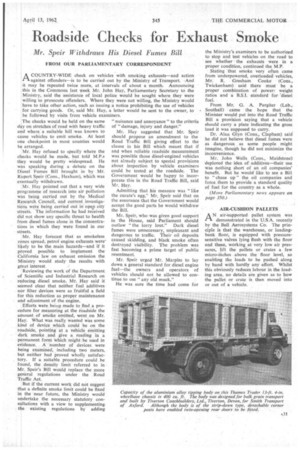Roadside Checks for Exhaust Smoke
Page 33

If you've noticed an error in this article please click here to report it so we can fix it.
Mr. Speir Withdraws His Diesel Fumes Bill
FROM OUR PARLIAMENTARY CORRESPONDENT
ACOUNTRY-WIDE check on vehicles with smoking exhausts—and action against offenders—is to be carried out by the Ministry of Transport. -And it may be repeated twice more, at intervals of about a month. Announcing this in the Commons last week Mr. John Hay, Parliamentary Secretary to the Ministry, said the assistance of local police would be sought where they were willing to prosecute offenders. Where they were not willing, the Ministry would have to take other action, such as issuing a notice prohibiting the use of vehicles for carrying goods. Or, said Mr. Hay, a letter would be sent to the owner, to be followed by visits from vehicle examiners.
The checks would be held on the same "nuisance and annoyance" to the criteria day on stretches of road with heavy traffic of "damage, injury and danger." and where a suitable hill was known to cause vehicles to emit smoke. At least one checkpoint in most counties would be arranged.
Mr. Hay refused to specify where the checks would be made, but told M.P.s they would be pretty widespread. He was speaking during a debate on the Diesel Fumes Bill brought in by Mr. Rupert Speir (Cons., Hexham), which was eventually withdrawn.
Mr. Hay pointed out that a very wide programme of research into air pollution was being carried out by the Medical Research Council, and current investigations were being carried out in opep city streets. The information he had received did not show any specific threat to health from diesel fumes alone in the concentrations in which they were found in our streets.
Mr. Hay forecast that as smokeless zones spread, petrol engine exhausts werelikely to be the main hazards—and. if it proved possible to implement the California law on exhaust emission the Ministry would study the results with great interest.
Reviewing the work of the Department of Scientific and Industrial Research on reducing diesel smoke, Mr. Hay said it seemed clear that neither fuel additives nor filter devices were as fruitful a field for this reduction as proper maintenance and adjustment of the engine.
Efforts were being made to find a procedure for measuring at the roadside the amount of smoke emitted, went on Mr. Hay. What was really wanted was some kind of device which could be on the roadside, pointing at a vehicle emitting dark smoke and give a reading in a permanent form Which might be used in evidence. A number of devices were being examined, including two meters, but neither had proved wholly satisfactory. If a suitable procedure could he found, the density limit referred to in Mr. Speir's Bill would replace the more general regulations under the Road Traffic Act.
But if the current work did not suggest that a definite smoke limit could be fixed in the near future, the Ministry would undertake the necessary statutory consultations with a view to supplementing. the existing regulations by adding Mr. Hay suggested that Mr. Speir should propose an amendment to the Road Traffic Bill giving effect to the clause in his Bill which meant that if and when reliable roadside measurement was possible those diesel-engined vehicles not already subject to special provisions about inspection by vehicle examiners could be tested at the roadside. The Government would be happy to incorporate this in the Road Traffic Bill, said Mr. Hay.
Admitting that his measure was "like the curate's egg," Mr. Speir said that on the assurance that the Government would accept the good parts he would withdraw the Bill.
Mr. Speir, who was given good support in the House, said Parliament should outlaw "the lorry lout." Dark diesel fumes were unnecessary, unpleasant and dangerous to traffic. Their oil deposits caused skidding, and black smoke often destroyed visibility. The problem was fast becoming a prime target of public resentment.
Mr. Speir urged Mr. Marples to lay down a general standard for diesel engine fuel—the owners and operators of vehicles should not be allowed to continue to use "any old muck."
He was sure the time had come for the Ministry's examiners to be authorized to stop and test vehicles on the road to see whether the exhausts were in a proper condition, continued the M.P.
Stating that smoke very often came from 'underpowered, overloaded vehicles, Mr. R. Gresham Cooke (Cons., Twickenham) said there must be a proper combination of power: weight ratios and a B.S.I. standard for 'diesel fuel.
From Mr. G. A. Pargiter (Lab., Southall) came the hope that the Minister would put into the Road Traffic Bill a provision saying that a vehicle should carry a plate indicating the gross load it was supposed to carry.
Dr. Alan Glyn (Cons., Clapham) said he did not believe that diesel fumes were as dangerous as some people might imagine, though he did not minimize the inconvenience.
Mr. John Wells (Cons., Maidstone) deplored the idea of additives—their use was nothing short of an oil companies' benefit. But he would like to see a Bill to "chase up" the oil companies and force, them to provide a standard quality of fuel for the country as a whole, (More Parliamentary news appears on page 350.) AIR-CUSHION PALLETS
AN air-supported pallet system was demonstrated in the U.S.A. recently by the Bell Aerosystems Co. The principle is that the warehouse, or loadingbank floor, is equipped with pressuresensitive valves lying flush with the floor and these, working at very low air pressures, lift the pallets or crates a few micro-inches above the floor level, so enabling the loads to be pushed along by hand with hardly any effort. Whilst this obviously reduces labour in the loading area, no details are given as to how the pallet or crate is then moved into or out of a vehicle.




















































































































